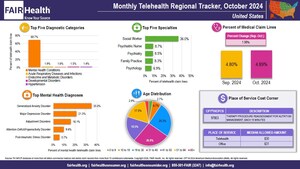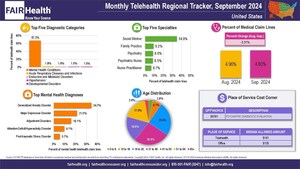FAIR Health Launches Interactive Tool Tracking Cost of Giving Birth State by State
National Median In-Network Amount for C-section Is More Than $15,000
Alaska Has Highest Median In-Network Amount for Vaginal Delivery
NEW YORK, June 14, 2023 /PRNewswire/ -- Today FAIR Health launched the Cost of Giving Birth Tracker, a free, interactive tool tracking the cost of giving birth state by state. Available on FAIR Health's website fairhealth.org, the Cost of Giving Birth Tracker consists of heat maps that show state-specific and national median1 charge and allowed (in-network) amounts2 for vaginal deliveries and C-sections. The tool draws on the national, independent nonprofit FAIR Health's database of over 41 billion private healthcare claim records—the largest such repository in the country.
The Cost of Giving Birth Tracker includes inpatient and outpatient facility and professional costs. Services include the delivery itself (e.g., pharmacy, nursery, labor and delivery room, medical and surgical supplies, room and board for the mother), anesthesia, fetal nonstress tests, ultrasounds, laboratory work and a breast pump. The data come from the September 2022 release of the vaginal delivery and C-section FH® Total Treatment Cost benchmarks.
Among the findings of the Cost of Giving Birth Tracker:
- The national median allowed amount for C-section is $15,555.61, and the national median charge amount is $35,907.33.
- The national median allowed amount for vaginal delivery is $12,968.44, and the national median charge amount is $27,371.88.
- Alaska is the state with the highest median allowed amount for vaginal deliveries, $21,525.77, followed by (in order from highest to lowest) New York, New Jersey, Connecticut and Massachusetts.
- Alaska also had the highest median allowed amount for C-sections, $25,518.63, followed by New Jersey, New York, Connecticut and California.
- Alabama had the lowest median allowed amount for vaginal deliveries, $7,840.62, followed by (in order from lowest to highest), Louisiana, Maryland, Virginia and West Virginia.
- Alabama also had the lowest median allowed amount for C-sections, $8,913.31, followed by Louisiana, Maryland, Missouri and Oklahoma.
The Cost of Giving Birth Tracker is the latest addition to FAIR Health's series of trackers offering geographic windows into healthcare data. The series also includes the Monthly Telehealth Regional Tracker, which tracks telehealth utilization by region across the nation, and, in July, will include the Opioid Tracker, which will track opioid abuse and dependence and opioid overdose.
FAIR Health President Robin Gelburd stated: "FAIR Health is pleased to shine a light onto the costs of giving birth from state to state and nationally. With the Cost of Giving Birth Tracker, we once again use our vast data repository to inform healthcare stakeholders—including patients, policy makers, payors and providers—on issues that matter to them."
For the Cost of Giving Birth Tracker, click here.
Follow us on Twitter @FAIRHealth
About FAIR Health
FAIR Health is a national, independent nonprofit organization that qualifies as a public charity under section 501(c)(3) of the federal tax code. It is dedicated to bringing transparency to healthcare costs and health insurance information through data products, consumer resources and health systems research support. FAIR Health possesses the nation's largest collection of private healthcare claims data, which includes over 41 billion claim records and is growing at a rate of over 2 billion claim records a year. FAIR Health licenses its privately billed data and data products—including benchmark modules, data visualizations, custom analytics and market indices—to commercial insurers and self-insurers, employers, providers, hospitals and healthcare systems, government agencies, researchers and others. Certified by the Centers for Medicare & Medicaid Services (CMS) as a national Qualified Entity, FAIR Health also receives data representing the experience of all individuals enrolled in traditional Medicare Parts A, B and D; FAIR Health includes among the private claims data in its database, data on Medicare Advantage enrollees. FAIR Health can produce insightful analytic reports and data products based on combined Medicare and commercial claims data for government, providers, payors and other authorized users. FAIR Health's systems for processing and storing protected health information have earned HITRUST CSF certification and achieved AICPA SOC 2 Type 2 compliance by meeting the rigorous data security requirements of these standards. As a testament to the reliability and objectivity of FAIR Health data, the data have been incorporated in statutes and regulations around the country and designated as the official, neutral data source for a variety of state health programs, including workers' compensation and personal injury protection (PIP) programs. FAIR Health data serve as an official reference point in support of certain state balance billing laws that protect consumers against bills for surprise out-of-network and emergency services. FAIR Health also uses its database to power a free consumer website available in English and Spanish, which enables consumers to estimate and plan for their healthcare expenditures and offers a rich educational platform on health insurance. An English/Spanish mobile app offers the same educational platform in a concise format and links to the cost estimation tools. The website has been honored by the White House Summit on Smart Disclosure, the Agency for Healthcare Research and Quality (AHRQ), URAC, the eHealthcare Leadership Awards, appPicker, Employee Benefit News and Kiplinger's Personal Finance. FAIR Health also is named a top resource for patients in Dr. Elisabeth Rosenthal's book An American Sickness: How Healthcare Became Big Business and How You Can Take It Back. For more information on FAIR Health, visit fairhealth.org.
Contact:
Rachel Kent
Senior Director of Communications and Marketing
FAIR Health
646-396-0795
[email protected]
1 A median is the midpoint of the distribution of values below and above which there is an equal number of values.
2 A charge amount is the amount charged to a patient who is uninsured or obtaining an out-of-network service. An allowed amount is the total fee negotiated between an insurance plan and a provider for an in-network service, including both the portion to be paid by the plan member and the portion to be paid by the plan.
SOURCE FAIR Health

WANT YOUR COMPANY'S NEWS FEATURED ON PRNEWSWIRE.COM?
Newsrooms &
Influencers
Digital Media
Outlets
Journalists
Opted In





Share this article